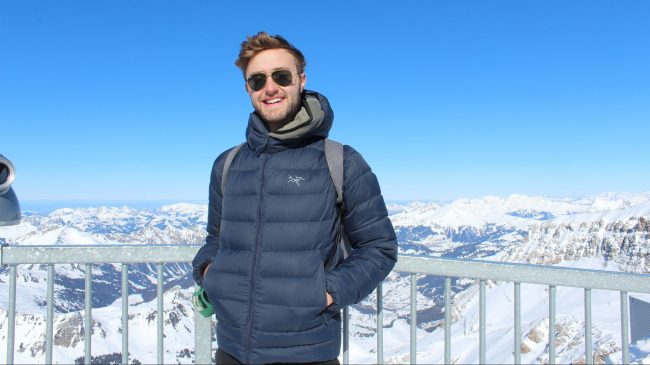Senior Shahar Hartman had planned for a straightforward study abroad experience, but when a piqued research curiosity led to initiative and determination, he wound up hopping trains around Switzerland to meet leading scholars in the field of international humanitarian aid. While there, Hartman researched and developed a thesis for his Immersion Vanderbilt degree requirement: examining the nuanced factors that affect the humanitarian aid decisions made by organizations and national governments.
“Geneva is kind of holy city for humanitarian aid,” said Hartman, a student double majoring in neuroscience and medicine, health, and society. “I wanted to understand all global factors that went into humanitarian aid decision-making, and I think I could have only done that in Switzerland. Because while every country delivers humanitarian aid, not every country does this level of research on humanitarian aid, nor has their neutrality.”
Hartman worked with librarians at the Geneva Library and the local university in Lausanne to explore related resources, which he used to create a wish list of in-person interviews. With the help of his new language skills and host family, he sent interview invitations in French to humanitarian aid scholars in Switzerland, and he was amazed by the responses.
“I ended up interviewing three very cool people,” Hartman said. “The first was in Bern with the director of where all humanitarian aid from Switzerland is sent, Olivier Praz. We chatted for two hours about his life experiences and how he set up the Swiss embassy in Cuba—all just incredibly informative.”
His second interview took him to the University of Geneva, where he learned about the semantics of humanitarian aid from scholar Alex Odlum.

“It was interesting to discuss how the different countries and NGOs talk about humanitarian aid, like the use of ‘power’ as a word,” Hartman said. “My big takeaway was that the stronger the country was, the less they use the word ‘power’—they don’t want to show that they are using soft power across the globe.”
It was the third interview, though, that blew Hartman away.
“My final interview was honestly a Hail Mary,” Hartman said. “I found myself sourcing one book over and over: The Golden Fleece by Antonio Donini, which is an incredible foundation of the geopolitics of humanitarian aid. I saw Donini was at Tufts University, and being from Boston, I decided to reach out and play that hometown card with the hopes of a Zoom interview.”
Hartman, completely shocked that Donini even replied to him, couldn’t believe his luck: Donini was living in a suburb of Geneva and willing to meet in person.
“I came with a ton of questions, and he answered everything,” Hartman said. “His resume was crazy! It was honestly an incredible experience, and I was able to quote him a lot in my final paper—such a highlight.”
When reflecting on his Immersion Vanderbilt research experience, Hartman encouraged fellow students to follow their curiosity, find their niche and don’t shy away from asking for conversations from their “wish list” of professionals. People, no matter how busy they are, he said, are usually happy to talk about their abilities and experiences.
After graduating in May, Hartman plans to work at Boston University in neuroscience research and eventually attend medical school.